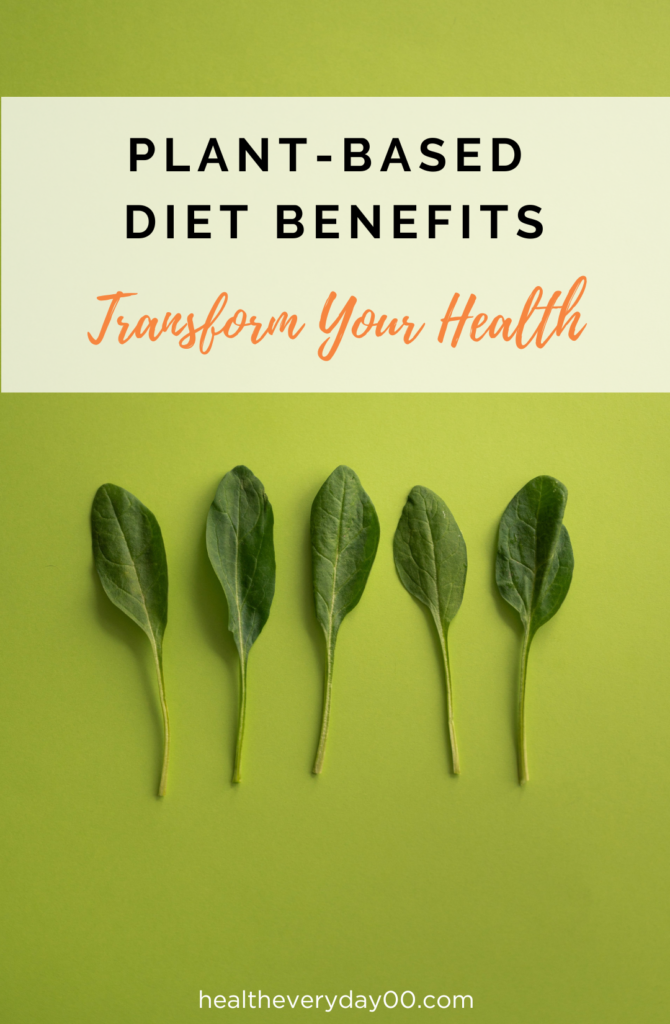Plant-Based Diet Benefits: Transform Your Health

- Plant-Based Diet Benefits: Transform Your Health
Introduction
In a world where dietary choices are constantly evolving, the shift towards plant-based diets has gained significant momentum. People are increasingly embracing plant-based eating not only for its potential health benefits but also for its positive impact on the environment. The Introduction sets the stage for exploring the transformative nature of plant-based diets, highlighting the growing popularity of this lifestyle and the mindful approach to sustainable eating.
Understanding Plant-Based Diets
Plant-based diets go beyond mere dietary choices; they represent a conscious decision to prioritize whole, plant-derived foods while minimizing or eliminating animal products. This section delves into the core principles of plant-based eating, differentiating between veganism, vegetarianism, and the broader concept of a plant-based lifestyle. It emphasizes the holistic approach of plant-based diets, considering not only health but also environmental and ethical considerations.
Health Benefits of Plant-Based Diets
1. Improved Heart Health
Plant-based diets have been linked to lower cholesterol levels and reduced blood pressure, contributing to improved cardiovascular health. This segment explores how the abundance of plant-derived foods positively influences heart health, making plant-based eating a powerful ally in preventing heart-related issues.
2. Enhanced Weight Management
The inclusion of fiber-rich and nutrient-dense foods in plant-based diets supports healthy weight management. This section discusses the role of plant-based eating in maintaining a balanced weight, dispelling myths surrounding weight concerns associated with this lifestyle.
3. Increased Energy Levels
A plant-based diet provides a sustained source of energy, reducing feelings of lethargy. This part of the article explores how plant-based eating can contribute to increased vitality and overall energy levels, debunking the misconception that such diets lead to fatigue.
Nutrient-Rich Plant-Based Foods
Plant-based diets are rich in a variety of nutrients obtained from fruits, vegetables, legumes, nuts, and seeds. This section highlights specific plant-based foods that are excellent sources of essential vitamins and minerals. It emphasizes the importance of diversity and balance in creating a nutritionally sound plant-based diet.
Environmental Impact and Sustainability
1. Contribution to Sustainable Food Systems
Plant-based diets play a crucial role in contributing to more sustainable food systems. This part explores how choosing plant-based options aligns with environmental sustainability goals, reducing the ecological footprint associated with food production.
2. Reducing Meat Consumption
By opting for plant-based alternatives, individuals actively participate in reducing the environmental impact of meat production. This section elaborates on the environmental benefits of plant-based diets, shedding light on how a reduction in meat consumption directly translates to lower greenhouse gas emissions, land use, and water consumption.
Addressing Common Concerns
1. Protein Intake in Plant-Based Diets
Dispelling the myth of protein deficiency in plant-based diets, this segment discusses the ample protein sources available to plant-based eaters. It emphasizes the diversity of plant-based protein options, including beans, lentils, tofu, and plant-based protein supplements.
2. Meeting Nutritional Needs
Addressing concerns related to meeting nutritional needs on a plant-based diet, this part provides practical solutions to ensure a well-balanced and nutritious intake. It highlights the importance of planning meals to include a variety of plant-based foods to cover essential nutrients adequately.
Tips for Transitioning to a Plant-Based Lifestyle
1. Start Gradually
This section provides guidance on transitioning to a plant-based lifestyle, encouraging readers to start gradually. It suggests easing into the lifestyle by incorporating more plant foods over time, making the adjustment more manageable and sustainable.
2. Explore New Flavors
Embracing the variety of plant-based cuisines is key to an enjoyable transition. This part of the article encourages readers to explore new flavors, experiment with different plant-based recipes, and discover the diverse and delicious world of plant-based eating.
Plant-Based Diet and Mental Health
Exploring the connection between diet and mental well-being, this section discusses how plant-based diets, rich in antioxidants and essential nutrients, can positively impact mood and cognitive function. It emphasizes the holistic nature of the benefits, extending beyond physical health to mental wellness.
Inspiring Success Stories
Real-life stories of individuals who have experienced health transformations through plant-based eating serve as powerful inspiration. This section shares anecdotes and testimonials, showcasing how embracing a plant-based lifestyle has positively influenced people’s lives, both in terms of health improvements and overall well-being.
Conclusion
In conclusion, the article summarizes the key benefits of adopting a plant-based diet. It reinforces the transformative impact of plant-based eating on personal health and the environment. The conclusion encourages readers to embrace the power of plant-based eating, not only for their own well-being but also for the collective health of the planet.



